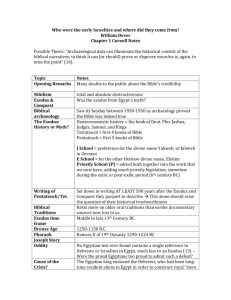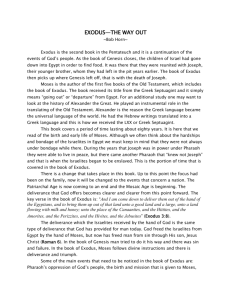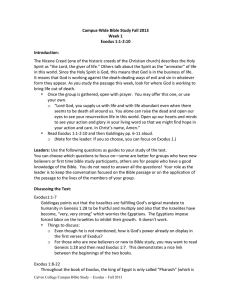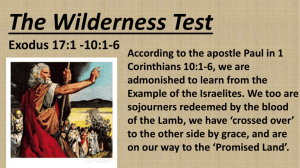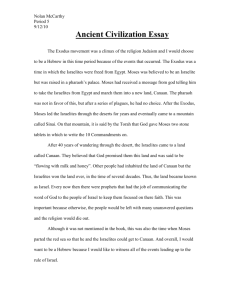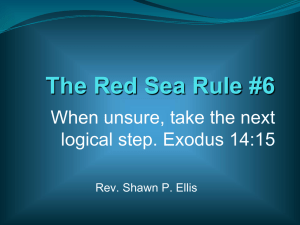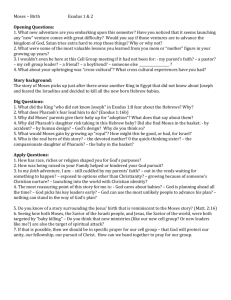Document 14396636
advertisement
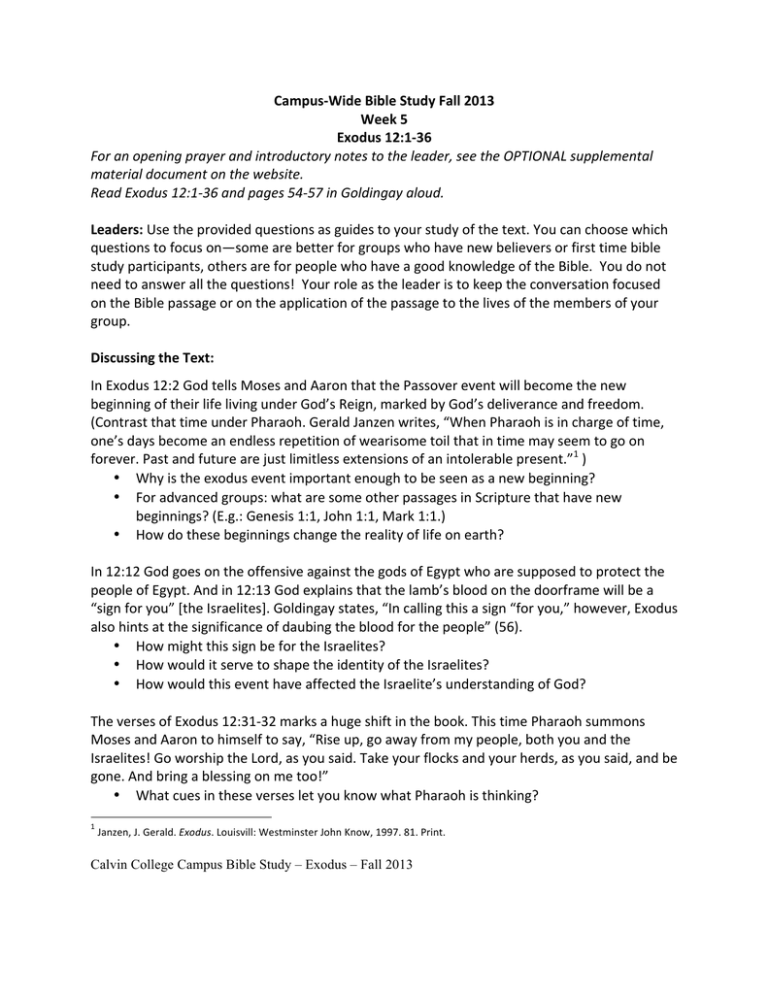
Campus-­‐Wide Bible Study Fall 2013 Week 5 Exodus 12:1-­‐36 For an opening prayer and introductory notes to the leader, see the OPTIONAL supplemental material document on the website. Read Exodus 12:1-­‐36 and pages 54-­‐57 in Goldingay aloud. Leaders: Use the provided questions as guides to your study of the text. You can choose which questions to focus on—some are better for groups who have new believers or first time bible study participants, others are for people who have a good knowledge of the Bible. You do not need to answer all the questions! Your role as the leader is to keep the conversation focused on the Bible passage or on the application of the passage to the lives of the members of your group. Discussing the Text: In Exodus 12:2 God tells Moses and Aaron that the Passover event will become the new beginning of their life living under God’s Reign, marked by God’s deliverance and freedom. (Contrast that time under Pharaoh. Gerald Janzen writes, “When Pharaoh is in charge of time, one’s days become an endless repetition of wearisome toil that in time may seem to go on forever. Past and future are just limitless extensions of an intolerable present.”1 ) • Why is the exodus event important enough to be seen as a new beginning? • For advanced groups: what are some other passages in Scripture that have new beginnings? (E.g.: Genesis 1:1, John 1:1, Mark 1:1.) • How do these beginnings change the reality of life on earth? In 12:12 God goes on the offensive against the gods of Egypt who are supposed to protect the people of Egypt. And in 12:13 God explains that the lamb’s blood on the doorframe will be a “sign for you” [the Israelites]. Goldingay states, “In calling this a sign “for you,” however, Exodus also hints at the significance of daubing the blood for the people” (56). • How might this sign be for the Israelites? • How would it serve to shape the identity of the Israelites? • How would this event have affected the Israelite’s understanding of God? The verses of Exodus 12:31-­‐32 marks a huge shift in the book. This time Pharaoh summons Moses and Aaron to himself to say, “Rise up, go away from my people, both you and the Israelites! Go worship the Lord, as you said. Take your flocks and your herds, as you said, and be gone. And bring a blessing on me too!” • What cues in these verses let you know what Pharaoh is thinking? 1 Janzen, J. Gerald. Exodus. Louisvill: Westminster John Know, 1997. 81. Print. Calvin College Campus Bible Study – Exodus – Fall 2013 How might he have said this, what tone would he have used? Why would Pharaoh ask Moses for a blessing? What is Pharaoh acknowledging in asking Moses for a blessing? Linking to Christ: • • • • The Gospel of John calls Jesus “The lamb of God who takes away the sin of the world” (John 1:29). Christians throughout the ages have made connections between the Passover in Exodus and Christ’s death. Compare and contrast the Passover in Exodus and Christ’s death on the cross. Both demonstrate God’s Lordship and love, and how these are manifested in freedom and new life. The Gospel of John is insistent in communicating that sin is rooted in denying Jesus (denying Jesus’ divinity or failing to submit to Jesus’ lordship). Likewise, in Exodus a major theme of the book is the knowledge that the Lord is God and not Pharaoh (or anyone else). Discussing the World: What are some events in the history of the United States or the nation you are most familiar with that mark time or have changed history? • How have these affected the national memory or mood? • What are some events in your own life that God has used to bring about new beginnings? • How have these events affected your understanding of your life? Goldingay points out that, Christ’s blood, “marks you as someone who through what Christ has done belongs to the people whom God had already claimed as his own and who have recognized that claim” (57). There are many claims on our time, energy and life. • How does being marked by God and claimed as his own make a difference in how you understand yourself and in how you use your life? The Egyptian war machine in Exodus and the cross in the Roman Empire on which Christ was crucified were human inventions. They were designed to control life and instill fear into the hearts of people, crushing all thoughts of sedition and hope beyond the empire. • In today’s world, what are some systems or ways of thinking that run contrary to God’s purposes for freedom and life? • In what ways is Christ challenging the false empires of control and death today? One example of a transition from control to shared leadership in our global context was the end of apartheid in South Africa, as whites and blacks moved toward leading their country together. • When have you seen people repent of the practices of death and destruction? • What was that process like for them? • Who was more harmed prior to repentance, the oppressors or the oppressed? Calvin College Campus Bible Study – Exodus – Fall 2013
